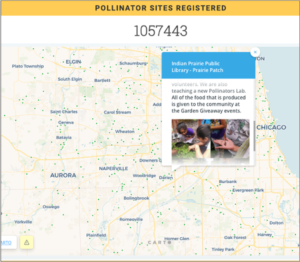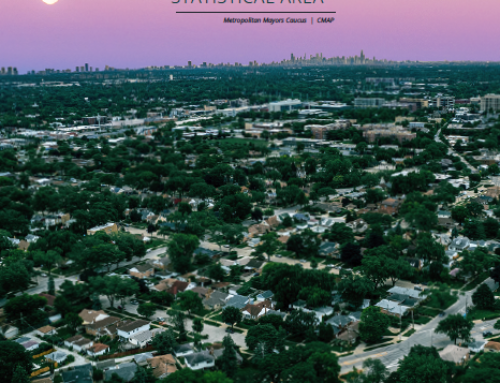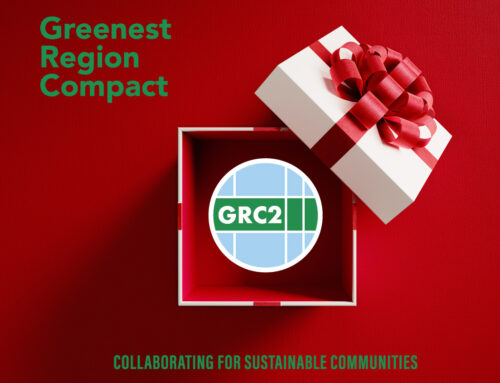 Earth Day is April 22nd, and Arbor Day is April 30th. For communities that are celebrating one or both of these days during the month of April, we’ve compiled resources that you can use to engage residents and help your community celebrate virtually. The items are organized by the categories of the Greenest Region Compact (GRC). Many of the resources do not cost anything to use and require minimal staff time to promote to your residents. The Caucus presented a majority of these ideas at a recent Environment Committee meeting and received suggestions in the chat about items to include in this toolkit. If you have an idea that we should share with other communities on this webpage, please email cscott@mayorscaucus.org.
Earth Day is April 22nd, and Arbor Day is April 30th. For communities that are celebrating one or both of these days during the month of April, we’ve compiled resources that you can use to engage residents and help your community celebrate virtually. The items are organized by the categories of the Greenest Region Compact (GRC). Many of the resources do not cost anything to use and require minimal staff time to promote to your residents. The Caucus presented a majority of these ideas at a recent Environment Committee meeting and received suggestions in the chat about items to include in this toolkit. If you have an idea that we should share with other communities on this webpage, please email cscott@mayorscaucus.org.
History of Earth Day and Arbor Day
The first Earth Day in 1970 launched the environmental movement, led to the creation of the Environmental Protection Agency (EPA) later that year, and influenced bipartisan laws that were passed to protect the environment. In 1969, Senator Gaylord Nelson of Wisconsin announced his idea for an Earth Day teach-in, after being inspired by the student anti-war movement. Senator Nelson hoped the event would lead to a national focus on environmental issues. He and other organizers chose April 22nd for the event date, a weekday in between spring break and final exams, to encourage participation from college students. The event was opened up to all Americans, and 10% of the U.S. population at that time (20 million people) participated in the first Earth Day in 1970. At the end of 1970, the first Earth Day led to the creation of the EPA and many environmental laws, including the Clean Air Act and the Occupational Safety and Health Act. In the following years, several other environmental laws were passed, including the Clean Water Act and the Endangered Species Act.
The first Arbor Day occurred in Nebraska in 1872, after newspaper editor J. Sterling Morton advocated for a tree-planting holiday called Arbor Day. Arbor Day became a legal holiday in Nebraska in 1885 and started to spread to other states. By 1920, 45 states and territories observed Arbor Day. Today, all 50 states celebrate Arbor Day. Most recognize the last Friday in April as Arbor Day, but some regions observe Arbor Day on other dates to coincide with the best tree-planting weather for their area.
SUSTAINABLE COMMUNITIES
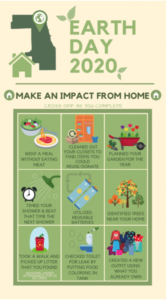
Cook County posted sustainable Bingo cards on Twitter to engage residents in taking environmentally friendly actions.
Host a sustainability challenge for residents or employees
- The Cook County Department of Environment and Sustainability held an Earth Month Bingo game in 2020 to encourage residents to take sustainable actions. Those who participated in the Twitter contest had the chance to win an advanced power strip. Cook County’s Earth Month blog post provides a recap of the Bingo cards they posted and the resources for each sustainable item. If your community is interested in using the Bingo cards, download them from the blog post or here. If you have questions about the cards, please email elaine.simon@cookcountyil.gov. Cook County residents are encouraged to participate in the County’s 2021 Earth Month Bingo game, which is happening on Twitter again this year.
- In January of 2021, the Cook County Department of Environment and Sustainability hosted a New Year, New You: Employee Sustainability Challenge. The contest asks employees to live more sustainably by self-reporting their actions for the week via Microsoft Forms. Participants were then entered into a drawing for a prize. The Cook County Department of Environment and Sustainability promoted the challenge via email and also hosted a Citizens Utility Board (CUB) utility bill clinic for employees. For more information about the Cook County Bingo game or the employee challenge, view the Environment Committee presentation slides on the topic or the meeting recording (starting at approximately 19 minutes into the meeting).
- Cook County also engaged residents and employees by asking them to take the Conserve Cook County Pledge. The pledge outlines actionable steps people can take in order to divert plastic from landfills and reduce energy consumption.
- Another resource for hosting a sustainable challenge in your community is the Ecochallenge Platform. The website can be used to engage residents and employees in cities of any size. The platform allows you to design your own Ecochallenge, which gives you the flexibility to engage your community in a unique way.
Engage residents in unique ways virtually
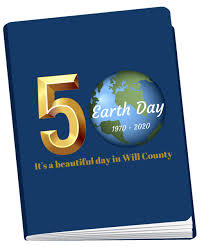 Several Will County agencies created an Earth Day Passport in 2020 and invited residents to complete “50 Acts of Green” to celebrate the 50th anniversary of Earth Day. When the shutdown occurred last year, the Will County organizations pivoted to a virtual passport program and created 123 sustainable activities that residents could complete at home or while outside, such as opting for paperless billing or taking a bicycle ride through their neighborhood. Participants that completed 15 or more actions were entered into a raffle for a prize. The organizations promoted the passport program through radio ads, social media ads, newspaper inserts, and electronic newsletters. For more information, view the Will County passport program report, the Caucus Environment Committee presentation slides on the
Several Will County agencies created an Earth Day Passport in 2020 and invited residents to complete “50 Acts of Green” to celebrate the 50th anniversary of Earth Day. When the shutdown occurred last year, the Will County organizations pivoted to a virtual passport program and created 123 sustainable activities that residents could complete at home or while outside, such as opting for paperless billing or taking a bicycle ride through their neighborhood. Participants that completed 15 or more actions were entered into a raffle for a prize. The organizations promoted the passport program through radio ads, social media ads, newspaper inserts, and electronic newsletters. For more information, view the Will County passport program report, the Caucus Environment Committee presentation slides on the 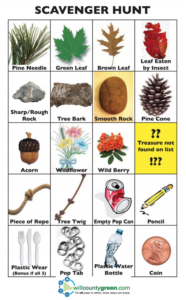 topic from Marta Keane, Will County Recycling Specialist, or the committee presentation recording (starting at 4 minutes into the video).
topic from Marta Keane, Will County Recycling Specialist, or the committee presentation recording (starting at 4 minutes into the video).- Because Will County staff members were unable to hold in-person events for Earth Day in 2020, they also created an additional Earth Day page on their website to engage residents in sustainability. The county posted past PowerPoint presentations on sustainability that staff had created over the years, if the topic was still relevant, so that residents could learn about environmental issues at home. Will County also created a few new presentations for the website, a scavenger hunt game for residents, and an environmental Bingo game. Additionally, the county partnered with environmental organizations to provide webinars on sustainability topics.
Create a sustainability award
The Village of Lombard Board of Trustees created a Sustainability Award in 2011 to reward and promote building projects that go beyond permit requirements in sustainable construction, operations, maintenance and education. The Public Works & Environmental Concerns Committee considers nominations before approval by the Board of Trustees. Then the Village President publicly presents winners with a plaque. For more information on the program, go to www.villageoflombard.org/environmental.
Write an article series for Earth Month
Kane County is publishing a Countdown to Earth Day series of articles that are posted on the Kane County Connects e-newsletter website through Earth Day on April 22.
Promote the One Earth Film Fest
Each year, communities can let their residents know about the One Earth Film Festival. In 2021, the virtual film fest was held on March 5-14, 2021. The Earth Week Mini Film Fest runs from April 19-25, 2021. The festival includes films on sustainability that educate the public, inspire residents to take action through the emotional appeal of film, and offer after-film programming that further informs patrons about actions they can take on sustainability issues. Municipalities may wish to promote all of the films on their community calendars or certain films that are relevant to their organization.
Promote citizen-science projects
Citizen-science is the practice of scientific research, in which the general public aids in data collection or monitoring. Public participation may vary from project to project but can include wildlife-monitoring programs, online databases, visualization and sharing technologies, or other community efforts. The Illinois Department of Natural Resources (IDNR) hosts a website that outlines a variety of citizen-science projects available to people in Illinois. Promoting these projects or encouraging the practice of citizen-science can be a great way for residents to engage with Illinois wildlife and nature.
![]() The above actions meet several GRC Sustainable Communities objectives, including Objective SC45: Encourage the community to participate in sustainability initiatives and events, SC35: Educate the community about sustainability initiatives using existing municipal communication outlets, SC52: Promote green building practices to residents, businesses and developers, SC37: Use community festivals, lectures, workshops and other events to share information about sustainability, and SC38: Distribute sustainability information and resources provided by other allied organizations and government agencies
The above actions meet several GRC Sustainable Communities objectives, including Objective SC45: Encourage the community to participate in sustainability initiatives and events, SC35: Educate the community about sustainability initiatives using existing municipal communication outlets, SC52: Promote green building practices to residents, businesses and developers, SC37: Use community festivals, lectures, workshops and other events to share information about sustainability, and SC38: Distribute sustainability information and resources provided by other allied organizations and government agencies
CLIMATE
Inform residents about air pollution action days
Promote Enviro Flash sign-up, which is a system that sends emails about daily air quality forecasting.
Educate the public about climate change solutions
Connect your residents to Project Drawdown’s free Climate Solutions 101 video course. The six-part video series focuses solely on climate solutions, rather than rehashing well-known climate challenges. Project Drawdown is a nonprofit that seeks to reach “Drawdown,” the point when greenhouse gases are declining instead of rising. The organization was co-founded by Paul Hawken, editor of the 2017 New York Times best-selling book, “Drawdown: The Most Comprehensive Plan Ever Proposed to Reverse Global Warming.”
![]() GRC Climate Goal: Engage the community in climate change, Objectives C18: Inform the community about air quality index and air pollution action days, C16: Educate the public about climate change
GRC Climate Goal: Engage the community in climate change, Objectives C18: Inform the community about air quality index and air pollution action days, C16: Educate the public about climate change
ENERGY
Share energy-saving information with residents
Use the communication materials on the Caucus’ Residential Energy Efficiency & Assistance Programs webpage to share energy-saving information with residents. Our webpage includes descriptions of various programs, as well as sample newsletter articles, social media posts, water bill messages, webpage material for your site, and sample images you can use. If you would like to be notified with updates on these energy-saving programs, contact Sustainability Specialist Cheryl Scott at cscott@mayorscaucus.org to join our email list on the topic.
Share information about free home energy assessments
 ComEd has partnered with natural gas utilities in the area to offer residents free in-home or virtual energy assessments. The home energy assessment includes a free inspection to determine energy-saving opportunities, a personalized assessment report, and free energy-saving products. The free products ComEd offers are LED bulbs, energy-efficient showerheads and aerators, hot water pipe insulation, and programmable thermostats. Smart thermostats are available for purchase at a discount. ComEd energy advisors will install the products at no cost during in-home assessments and will send the customer products during virtual assessments. To share this information with your community, go to the Caucus’ Residential Energy Efficiency & Assistance Programs webpage to download sample communications materials that can be used to spread this energy-saving information to residents.
ComEd has partnered with natural gas utilities in the area to offer residents free in-home or virtual energy assessments. The home energy assessment includes a free inspection to determine energy-saving opportunities, a personalized assessment report, and free energy-saving products. The free products ComEd offers are LED bulbs, energy-efficient showerheads and aerators, hot water pipe insulation, and programmable thermostats. Smart thermostats are available for purchase at a discount. ComEd energy advisors will install the products at no cost during in-home assessments and will send the customer products during virtual assessments. To share this information with your community, go to the Caucus’ Residential Energy Efficiency & Assistance Programs webpage to download sample communications materials that can be used to spread this energy-saving information to residents.
Host a virtual utility bill clinic
Partner with the Citizens Utility Board (CUB) to host a virtual utility bill clinic. At the event, CUB will help residents save money and inform residents about energy efficiency and utility bill assistance programs. CUB will manage the event by handling registrations, designing a promotional flyer, and running the event on Zoom. Communities can help promote the event. If your community is interested in setting up a virtual utility bill clinic, contact CUB Outreach Coordinator Joe Giamberdino at jgiamberdino@citizensutilityboard.org.
GRC![]() Energy Objective: Collaborate to educate the community about clean energy options.
Energy Objective: Collaborate to educate the community about clean energy options.
LAND
Encourage planting and registering of pollinator gardens
There has been a lot of interest in pollinator gardens. Municipalities can simply promote the following actions that residents can take, which reflect well on the community:
- Residents can register their pollinator garden and upload a photo at the Pollinator Partnership Million Pollinator Garden Challenge website, as seen to the right. Although one million pollinator gardens have already been registered, the challenge is a good way to document and measure actions taken to protect pollinators.
- The Conservation Foundation offers two certifications that gardeners can strive to achieve: Conservation@Home and Conservation@Work. Gardeners who meet the standards can be recognized for different plantings and practices. The residents or businesses who get certified will receive a Conservation@Home or Conservation@Work sign to place on their property for recognition of their good environmental stewardship and conservation.
Connect residents to native plants and information
The La Grange Environmental Quality Commission partnered with the La Grange Park Sustainability Commission in 2019 to offer a bike tour that directed participants to homes, schools and organizations with native plant gardens, including one home with solar panels. The goal of the tour was to inform residents on how to create and maintain a native plant garden. The two commissions are planning a 2021 native plant tour for late July.
GRC![]() Land Goal: Sustain beautiful landscapes that also provide ecosystem services, Strategies L30d: Encourage planting and registering of pollinator gardens through the Million Pollinator Garden Challenge, L30b: Promote native and sustainable landscaping initiatives community-wide by connecting residents to plants and information
Land Goal: Sustain beautiful landscapes that also provide ecosystem services, Strategies L30d: Encourage planting and registering of pollinator gardens through the Million Pollinator Garden Challenge, L30b: Promote native and sustainable landscaping initiatives community-wide by connecting residents to plants and information
MOBILITY
Encourage residents to walk and bike
The National Forum for Heart Disease and Stroke Prevention hosts a Move with the Mayor (MWTM) Challenge, an initiative that involves working with mayors to challenge their communities to get outside, be active, and improve citizens’ health. The challenge runs from July to October, but could be announced for Earth Day because both Earth Day and MWTM encourage residents to spend time outside. Mayors who sign up for MWTM must participate in a few events about the heart health benefits of physical activity (e.g., with employees, community leaders and/or the public – socially distanced or virtual), deliver consistent messages to promote physical activity with assistance from the National Forum’s resource toolkit, and complete a Step It Up! Success Roadmap. To enroll your community before mid-July for this year’s challenge, email Carly Smitherman at carly.smitherman@nationalforum.org.
The 2020 participating cities in Illinois were Bartlett, Bloomingdale, Glen Ellyn, Hanover Park, and West Chicago. Brief videos of the participating DuPage County mayors can be seen here and also at this link.
![]() GRC Mobility Goal: Promote sustainable transportation choices, Objective M34: Encourage residents and visitors to walk and bike
GRC Mobility Goal: Promote sustainable transportation choices, Objective M34: Encourage residents and visitors to walk and bike
WASTE & RECYCLING
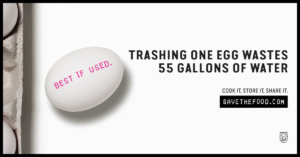
The Save the Food campaign offers social media images on food waste that can be shared.
Educate the community about food waste
The Natural Resources Defense Council and the EPA have partnered on a Save the Food communications campaign. Communities can use the resources toolkit (containing videos, social media templates, posters, flyers, etc.) to educate the community about food waste, saving money, and reducing the waste stream.
![]() GRC Waste & Recycling Goal: Engage the community in waste reduction and recycling
GRC Waste & Recycling Goal: Engage the community in waste reduction and recycling
WATER
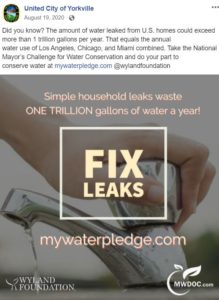
The United City of Yorkville engaged residents on social media about the water conservation challenge.
Mayor’s Challenge for Water Conservation
The Wyland National Mayor’s Challenge for Water Conservation was created to reward residents for positive water conservation behavior, provide real-time results of each city’s progress, set goals to promote conservation behavior, and celebrate public role models in encouraging behavior change. Once a community agrees to participate in the no-cost challenge, residents will be able to go to www.mywaterpledge.com and take the four-step pledge for water conservation on behalf of the municipality. Then residents can see current municipal standings, encourage their friends and family to participate, and even win prizes. Yorkville and Naperville ranked in the top 10 for their population categories in 2020. In 2021, the water conservation challenge will take place from April 1st-30th.
Metropolitan Water Reclamation District (MWRD) Virtual Tours
Communities may want to promote the MWRD free virtual tours, which can educate their residents on how the MWRD protects area waterways and transforms wastewater into clean water. On the tour, residents will travel back in time to early Chicago to see how the MWRD reversed the Chicago River and developed wastewater treatment technology. Attendees will also go behind the scenes and underwater to see how the MWRD transforms the water residents use every day; descend 300 feet into the deep tunnel system; and watch the MWRD’s electrofishing crew at work sampling fish on the Chicago River.
The virtual tours are a monthly event, with the next events occurring on Tuesday, March 16th, and Wednesday, April 14th.
![]() GRC Water Goal: Engage the community in water stewardship
GRC Water Goal: Engage the community in water stewardship
ECONOMIC DEVELOPMENT
Promote local spending
 As one example, the City of Wood Dale used CARES Act funding to spur local spending with its Wood Dale Dollars program. Each household received four $10 coupons, which could be used at participating local businesses, toward water bills, or as a donation to a local food pantry.
As one example, the City of Wood Dale used CARES Act funding to spur local spending with its Wood Dale Dollars program. Each household received four $10 coupons, which could be used at participating local businesses, toward water bills, or as a donation to a local food pantry.
![]() GRC Economic Development Objectives: ED8: Promote local goods and services, ED11: Promote the economic prosperity of the community
GRC Economic Development Objectives: ED8: Promote local goods and services, ED11: Promote the economic prosperity of the community

